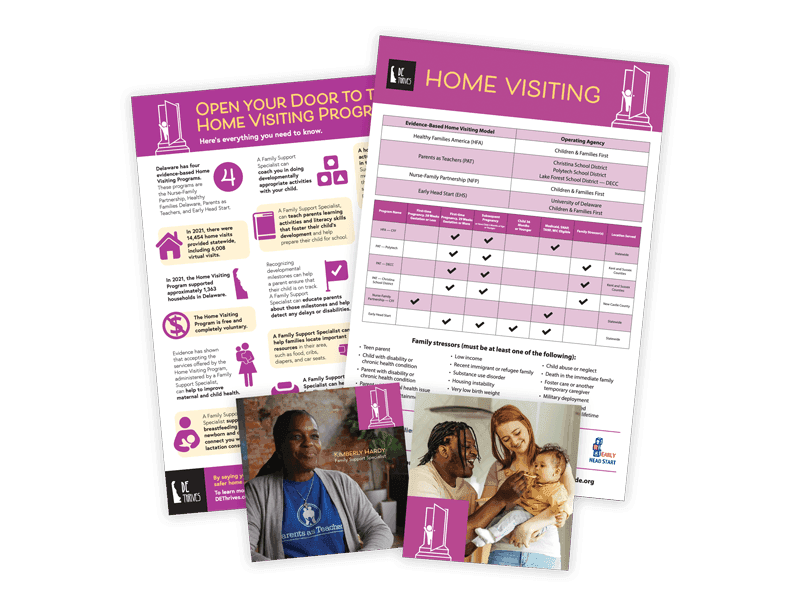Providers and Community Partners
Evidence-Based Home Visiting
Evidence-based home visiting is a free voluntary service for at-risk pregnant women and families with children up to age five (5) years. Programs have demonstrated improvements in a wide range of maternal and child health outcomes. The services provided support positive parenting, improve maternal and child health outcomes, help prevent child abuse and neglect, and aid young children with literacy, meeting developmental milestones, and school readiness.

Why home visiting?
It’s ensuring all pregnant and parenting families have access to high quality home visiting services customized to meet their unique needs. Home visiting supports families by addressing social health factors and improving overall well-being. Family Support Specialists build trust with families through regular visits, enabling meaningful impacts beyond what healthcare providers can offer.
Family Support Specialists come to the home or at another location of the family's choosing and will conduct activities during the visit that could include:
Assisting with prenatal care and screenings Providing health education (e.g., breastfeeding, safe sleep) Connecting to community resources Supporting child development and a healthier home environment Helping with employment or education goals
Home visiting complements, not replaces, OB/GYN, family, or pediatric care.
New reporting protocols includes:
An Enrollment Letter is sent to primary care providers if their patient enrolls in the Home Visiting program A Referral Letter is sent to referring agencies to provide an update on the status of the referral A Quarterly Feedback Form is sent to primary care providers to provide updates on assessments and education given
“Studies have found a return on investment of $1.80 to $5.70 for every dollar spent on home visiting. This strong return on investment is consistent with established research on other types of early childhood interventions.”
In Delaware, there are five Home Visiting Programs

Home Visiting can benefit families
While Home Visiting can benefit all families, it is especially valuable to those needing extra support and connections to a range of support services. Families with one or more of the following situations benefit most from home visiting programs:

Low income First-time parent Low educational attainment Unemployed Under 21 years of age History of/current substance abuse Families that include individuals who are serving in the US military

Delaware Family Support Hub App
Now available on the App Store and the Play Store
The Delaware Family Support Hub app simplifies your preparation and enhances your visits by putting everything you need right at your fingertips. Quickly access detailed guides, expert advice, and resources for any situation, even unexpected ones. Visit the Delaware Family Support Hub
Resources
Keep in touch
Join our email list to stay up to date with the latest Home Visiting news and events.
View our past issues:
Home Visiting Committees
CAB promotes a cross-sector collaboration among relevant state and community-based organizations to reduce duplication and advance common goals.
MSHAC meetings have been held since 2016. The committee meets quarterly and are virtual. For more information or to inquire about how you can get involved please contact:
MSHAC Meetings/Minutes
Home Visiting Events
Video
Keynote speaker Kaitlin Watts presented Connecting Systems, Communities, and Families: Early Childhood from the Ground Up.

Pictured from left to right, Crystal Sherman, DPH MCH Bureau Chief, Emily Thompson, DPH Home Visiting Program Administrator, and the Honorable Kyle Evans Gay, Lieutenant Governor.
See all photos from this years retreat
Home Visiting Retreat 2025 photo albumHome Visiting Toolkits

Home Visiting Toolkit
The Home Visiting Program provides support to new and expecting families where they need it. We offer materials you can use to help you spread the word to families who may need support.
View toolkit
Home Visitor and Community Health Worker (HV & CHW) Partnership Toolkit
Home Visitor & Community Health Worker (HV & CHW) Partnership Toolkit Description: The Home Visitor & Community Health Worker Partnership Toolkit provides practical strategies and resources to strengthen collaboration between Home Visitors and Community Health Workers. It supports integrated, family-centered care through shared roles, practical communication tools, and best practices in community engagement.
View toolkit
Infant & Early Childhood Mental Health Consultation (IECMHC) Toolkit
Infant & Early Childhood Mental Health Consultation (IECMHC) Toolkit Description: The Infant & Early Childhood Mental Health Consultation (IECMHC) Toolkit provides professionals with essential knowledge, tools, and templates to implement Delaware’s IECMHC model. Designed to support the early childhood workforce, this resource helps strengthen systems of care and better equip providers to help Delaware families and young children thrive through guidance on consultation approaches, program integration, and best practices.
View toolkitResources

2017-2021 Delaware Home Visiting Report
A comprehensive document that provides a picture of home visiting within DE. Intended to serve as a critical and foundational resource to better understand the needs of at-risk families; accessing services in perinatal, maternal, and early childhood systems; revealing maternal and child population trends; determining areas of increasing or decreasing risk; and identifying potential resources to support families in need.

Maternal, Infant, and Early Childhood Home Visiting Program (MIECHV) Needs Assessment

Home Visiting Professional Titles and Acronyms Fact Sheet
MIECHV Data Table

